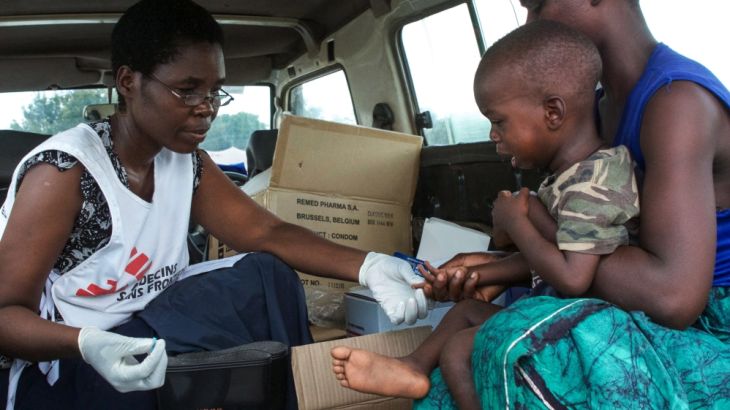Anger rife in flood-hit Malawi
As one of the world’s poorest nations tries to deal with floods, aid is slow to reach the people who need it.

Malawians are angry, at least many of those who have been uprooted from their homes by floods after days of heavy rains.
They are angry that they did not receive the necessary help from their government or aid agencies when they needed it most. Some have been sleeping rough on top of hills after they fled the rising waters. Others are sleeping on the floors of school classrooms, without food, blankets or dry clothes.
Keep reading
list of 4 items‘Mama we’re dying’: Only able to hear her kids in Gaza in their final days
Europe pledges to boost aid to Sudan on unwelcome war anniversary
Birth, death, escape: Three women’s struggle through Sudan’s war
The level of anger was evident when we traveled on Friday with the Malawian airforce on a mission to evacuate a group trapped in an area on the outskirts of Nsanje – the most affected district in the country. The airforce and police who accompanied the mission were also hoping to persuade people to move to government shelters situated in the town of Bangula.
When we reached Nsanje, we found women cooking in the open. It’s also where they’d been sleeping as well. Children were playing in the mud. Inside a crumbling mud-hit, an elderly and clearly unwell woman tried to sleep.
Men, tasked with looking after their loved ones were most hostile towards the rescue workers at first.
“Where were you when our people were dying – when we needed your help” one man shouted.
After a lot of back and forth, and careful negotiation, some agreed to be airlifted from the site and to the the camp in Bangula.
But others stubbornly refused to leave.
Those frustrated by the response to their plight are, perhaps, justified. Aid and emergency efforts were slow – and to many it remains so.
To be fair a disaster of this magnitude was unexpected even though parts of Malawi are flood prone. Those who live in these zones have often found a way of dealing with the problem after decades of living with it.
But these floods were different. The dramatic rains affected more areas than ever, including many areas which usually do not experience floods. Roads and bridges have been washed away, cutting off crucial supply routes.
On Tuesday, President Peter Mutharika declared a state of emergency in fifteen districts and appealed for help from the international community. The death toll now stands at 176 with more than 200,000 people displaced.
The government is trying to ensure that the displaced are fed as a priority. At this point, they are receiving mostly maize and beans, but there are children under five and elderly people who need special meals.
It is clear that Malawi cannot deal with this disaster all on its own.
This Southern African country is one of the poorest in the world and the government simply does not have enough money to even properly run its administration.
As is it stands, international donors have withheld 40 percent of their budgetary support of the nation after a corruption scandal in 2013 – in which more than $30m was stolen from government coffers. The scandal almost brought Malawi to its knees and the effects are being felt to date.
So this disaster will only add further strain to an already struggling state.
Help is coming though – albeit slowly.
The World Food Programme (WFP) plans to airlift more than 100 metric tonnes of high energy biscuits. This will be enough to meet immediate food needs of 77,000 people.
But we have not even started talking about other basic supplies that are still not available: blankets, mosquito nets, mattresses, clothes, cooking utensils. Most people came to the shelters with nothing.
And rescue workers are still trying to reach those who are trapped, but getting supplies to these people is a logistical nightmare. Authorities are using boats and two military helicopters to try and reach the ones most in need.
There’s also the very real threat of water-borne diseases like cholera both in the shelters and villages.
Robert Kisyula, national director of NGO World Vision, told me that the camps are crowding fast and sanitation facilities are hardly enough.
“We need to prepare better, get everyone on board. If the rains continue and we experience more flooding I’m afraid the situation will be catastrophic.” he said.
For now, the flood waters are receding and people have started going back home, unsafe as it is, to rebuild.